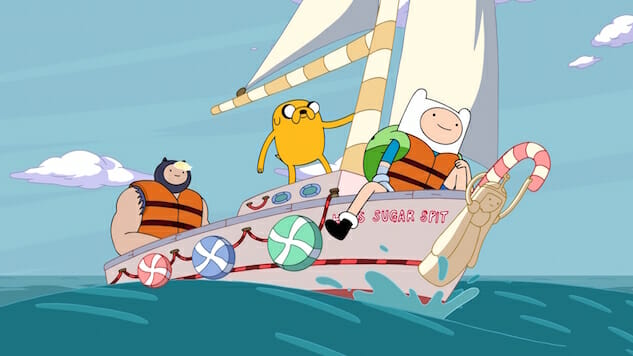Adventure Time’s Islands Miniseries Is a Dark Meditation on Technology and the Human Spirit
Cartoon Network

“The earth has become small, and on it hops the Last Man, who makes everything small.” – Friedrich Nietzsche, Thus Spoke Zarathustra
Adventure Time has built a vast, rich mythos over the past seven years, but one massive question has remained unanswered: What happened to all the humans? Finn’s (Jeremy Shada) status as the supposed last of his species has been crucial to his development—he’s Finn the Human because he is a unique creature in a land of bizarre mutants—and that identity, as Islands shows, has more allure to him than the series has ever exposed before. So, when he discovers that there are other humans, including his long-lost mom, that information shakes him to the core—and awakens within him a desire to know and, potentially, to belong to a group.
An origin arc done well should hit hard in the feels department. And there are moments of Islands that do so, most notably the heartrending story of Susan Strong (Jackie Buscarino) and her childhood flame, Frieda, as told in “Hide and Seek,” the emotional peak of the miniseries. In comparison, the romance between Finn’s parents in “Min and Marty,” told immediately afterward, seems rushed and trite, particularly the unbelievably quick initial seduction. Indeed, none of the Finn-centric moments in Islands has as much impact as you’d expect. Perhaps this is because Adventure Time here makes inefficient use of its 11-minute format; Finn simply isn’t given the time to process the society he discovers, and the “Islands” episodes that would be totally fine as one-offs—the deadpan, hilarious “Whipple the Happy Dragon” and the sweet “Mysterious Island”—instead take valuable time from the character-driven focus. But fortunately, the relative emotional emptiness of “Islands” is made up for by classic Adventure Time philosophical musing, which here takes on shades of Black Mirror and existentialism to cast a critical eye on technology and the human spirit.
Post-apocalyptic worlds typically treat technology in one of two ways: extreme development (e.g. The Hunger Games) or none at all (e.g. Hawaii in Cloud Atlas). Islands adopts the former standpoint, giving us a world in which incredibly advanced bioengineering and cybernetics have kept humans alive and ensconced in relative comfort. But the twist is that the very scientific drive to innovate and develop these technologies is precisely what damned our species in the first place. The weapons that blew apart a quarter of the planet were human-made; even in the peace and security of the Islands, Dr. Gross (Lennon Parham)—a chilling villain who I hope we’ll meet again—succumbed to ambition, and she ended up killing 62% of the surviving human population with a supervirus.
-

-

-

-

-

-

-

-

-

-

-

-

-

-

-

-

-

-

-

-

-

-

-

-

-

-

-

-

-

-

-

-

-

-

-

-

-

-

-

-








































